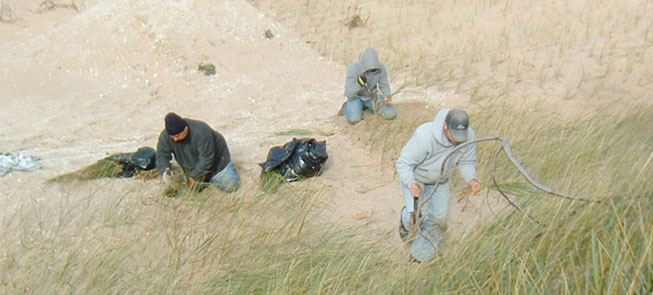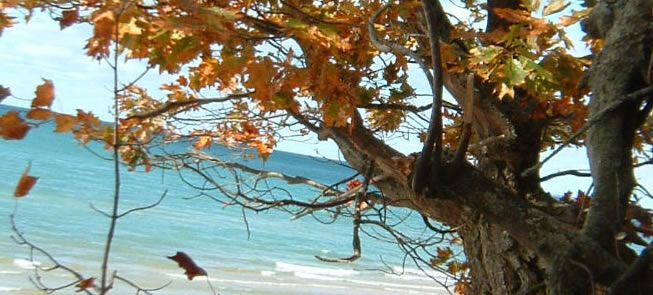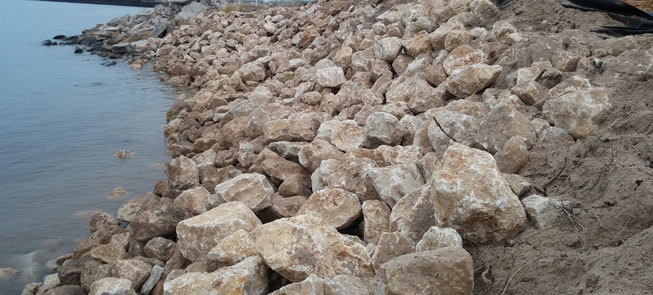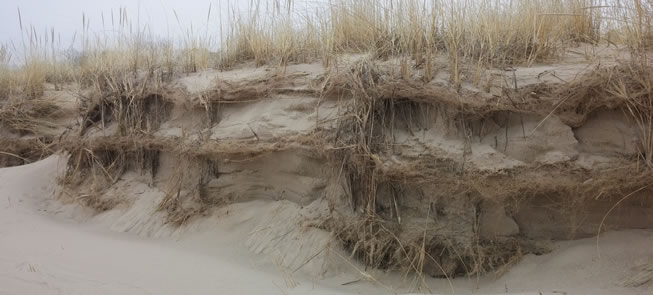Have you ever sat in a bathtub and pushed your body back and forth so that the water forms a big wave sloshing from end to end? If you think of Lake Michigan as a giant bathtub the giant wave that forms is known as a “seiche” (pronounced “say-sh”).
A seiche occurs when the wind from a heavy thunder storm like a supercell with extreme barometric changes literally stacks the water ahead of itself against the shore. When the storm front is past, the water sloshes back the other way to hit the opposite shore. It goes back and forth until it loses energy. Seeing that Lake Michigan is 118 miles wide and 307 miles long you can see that this sloshing effect covers quite a distance. It is expecially noticeable when the topography such as a narrow harbor or shallow depth forces the wave higher.
A seiche is such an interesting event because it resembles a tidal wave in the ocean or even a tsunami. The difference is that it is on an inland freshwater lake that is much smaller. It seems that seiches occur rather frequently in the one to two foot range–which is hardly noticeable. However in severe storms they can reach the height of four to five feet, and even ten feet in extreme events. Also, it must be remembered that the water level is different from the wave level. If there is a ten foot seiche the height of the waves is on top of that. As a result, the total height of the water crashing into shore can be sixteen to eighteen feet high.
When a seiche builds agianst the shore ahead of a storm the water level on the opposite side of the lake drops at the same time. The reason is obvious, the water is pushed from one side of the lake to the other side.
There are some amazing stories about seiche events, some of which even resulted in serious damage and loss of life.
On April 7, 1893 a gale pushed a seich of four to five feet high into the port of Chicago causing serious damage to many boats. At the same time in St. Joseph, Michigan it pushed inland seven hundred feet past the normal high water mark on the shore.
On June 26, 1954 a ten foot high seiche slammed into Chicago sweeping seven people off a dock to their deaths.
An especially interesting story occured in Muskegon, Michigan. On May 30, 1998 a giant thunderstorm known as a “derecho” ( pronounced “deret-cho”) tore across the Great Lakes causing tremendous damage with its tornado strength straight line winds. A tugboat crew saw the storm approaching and headed into the Muskegon harbor for safety. They felt the seiche pick them up and go past them. When the front of the storm passed the crew turned the boat around to head out of the harbor. The returning slosh of the seiche as it was focused by the narrow channel was so high and violent that it overturned the tugboat! Thankfully, the crew was rescued without serious injury or loss of life.
Even though most of us never think of the possibility of a seiche, all of the lakeshore communities have to keep it in mind when they plan for harbor and shoreline development.
I might think twice the next time I am tempted to go on a pier or breakwater when a storm is coming. No wonder there are deaths every year from storm watchers who go out on the piers.
A seiche reminds me of the way trials often hit us and seem to be overwhelming. Suddenly, it seems, accidents, sickness, death or temptation come to us and threaten to sweep us away and drown us. Our only hope in those times is that we are standing on the Rock, Christ, that is higher than any “seiche” that might seek to destroy our faith. No matter what may come our way, we are safe in Him. In fact, He turns trials and trouble to our good. Are you standing on your own or on the Rock? It is my prayer that you come to know Him as your Savior.
Don’t Come To My Church
Don’t come to my church
If you don’t have sin.
Just stay on your perch.
And, don’t come within.
Don’t sit in the pew
Looking down your nose.
Eschewing the few
Who may have plain clothes.
Don’t sing in the choir
If you’re not prostrate.
Your heart’s not on fire
For God Who is great.
We do welcome those
Who know they’re forgiven.
Whose humbleness shows
From grace freely given.
Deane Wassink
February, 2006





